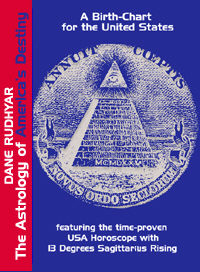 |
| Home | Bio | Art | Music | Literature | Civilization & Culture | Philosophy of Wholeness | Theosophy & Spirituality | Astrology |

THE ASTROLOGY
OF AMERICA'S DESTINY A Birth-Chart for the USA by Dane Rudhyar, 1974 THE ASTROLOGY OF AMERICA'S DESTINY Table of Contents
1. The Birth of the United States
as a Collective Person 2.The Roots of the American Nation Page 1 Page 2 Page 3 Page 4 Page 5 Page 6 Page 7 Page 8 Page 9 Page 10 3. America's Place in the Cosmic Process 4. A Birth Chart for the United States of America 5. Two Hundred Years of Growth Through Crisis 6. A Chart for the Beginning of the Federal Government 7. America at the Crossroads 8. Prospects for the Last Quarter Century Illustrations • George Washington receiving the horoscope of America from the Angel Gabriel • The Reverse Side of the Great Seal of the United States • A Chart for the United States of America • A Chart for the Beginning of the Federal Government • A Chart for Richard M. Nixon • A Chart for the Twentieth Century |

CHAPTER TWO:
The Roots of the American Nation - 5 African blacks were not the only human beings to experience a form of slavery in the American Colonies. There was another category of slavery for white people which differed only in that it was temporary: One step above these slaves were the convicts and bondservants, or men and women in a state of temporary involuntary servitude. These people were either political offenders or felon convicts. Those guilty of political offenses — as the Scots taken in the battle of 1650, the prisoners captured at the battle of Worcester in i651, Monmouth's men, 1685, the Scots concerned in the uprising of 1687, the Jacobins of 1716, the Scots who went out in 1745 — were, of course, of this class of offenders.These conditions in the Colonies and even during part of the 18th century were not different from those found in England. Profits made from the slave trade, and later (in England) from the cotton mills, were enormous. The greed generated by the possibilities of profit implied in the Industrial Revolution was appalling — as appalling as the greed for gold which led the Spanish conquistadors to torture, enslave and kill millions of inhabitants in the West Indies, and Central and South America. This was the legacy of the Old World to the New. To all the city poor, the heavily indebted small farmers, and the once indentured immigrant's, the words of the Declaration of Independence must have been welcomed as a ray of hope and a tremendous incentive to action. 2. From History of the People of the United States by John McMaster (quoted by James O'Neal in The Workers in American History, p. 46ff ). In the Encyclopedia of American Facts and Dates (T. Y. Crowen, New York, 19964), P. 28, it is said that in 1670 the Virginia legislature passed a law prohibiting the importation of convicts as indentured servants. Sustained for a time in the English Parliament, this act was finally repealed in 1717 by an act authorizing the transportation of convicts to America. The practice of settling Colonies by convicts or ex-prisoners has been universal. It provided the colonies with an aggressive type of men. Many great families of today in countries which were once European colonies have ancestors who had broken the laws of the mother country. Return By permission of Leyla Rudhyar Hill Copyright © 1974 by Dane Rudhyar and Copyright © 2001 by Leyla Rudhyar Hill All Rights Reserved.  Web design and all data, text and graphics appearing on this site are protected by US and International Copyright and are not to be reproduced, distributed, circulated, offered for sale, or given away, in any form, by any means, electronic or conventional. See Notices for full copyright statement and conditions of use. Web design copyright © 2000-2004 by Michael R. Meyer. All Rights Reserved. |
 |